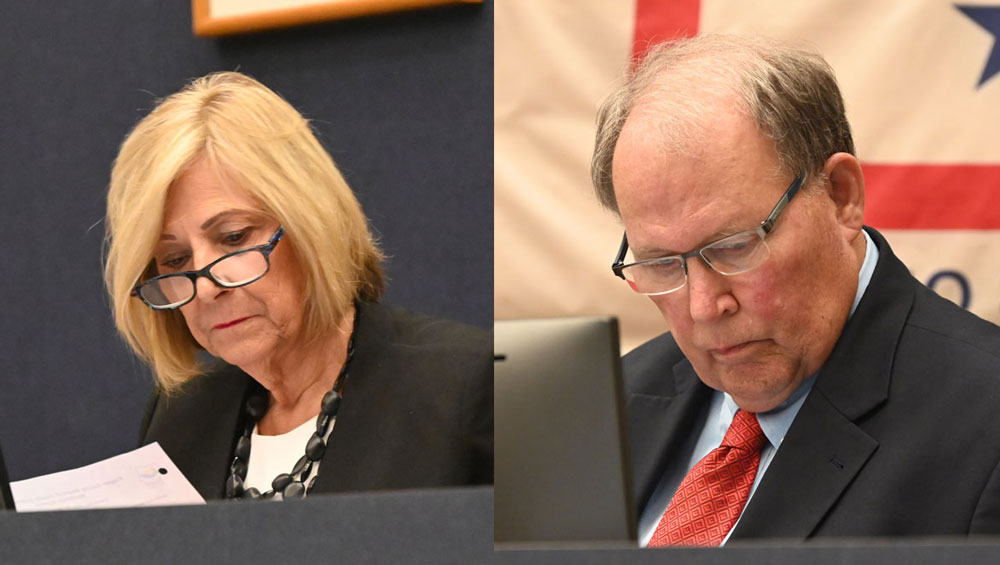Flagler County Commissioner Kim Carney was not pleased when she learned that the county will not impose a specific type of tax on owners of beachfront properties as part of a beach-protection plan beginning this fall.
What began as a position statement on beach policy at this morning’s commission meeting swiftly turned into accusations, with Carney accusing the administration of inaction, Commissioner Greg Hansen accusing Carney of sabotage, and Commissioner Pam Richardson accusing Hansen of fabricating things (which he didn’t). These accusations once more exposed the flaws that caused the commission’s long-term beach-management plan to fail, leaving the county with few options going forward.
The harsh conversation emphasized the unavoidable: Outside of a series of short-term, poorly funded stopgap measures, Flagler County and its cities had no plan to safeguard their beaches.
An increase in the sales tax was a prerequisite for the $114 million plan. Commissioner Pennington, Richardson, and Carney were against it. Any expectation of a consistent, long-term beach building and maintenance program in the next years was dashed by the proposal.
In order to raise money for beach conservation, Carney continued to believe that the county would impose a special fee along 10 miles of unincorporated Flagler County (or the entire 18 miles of the barrier island, but she wasn’t sure). However, such strategy would have generated insignificant revenue in comparison to necessities, and although the county is getting ready to create such a taxing district by the end of 2026, the exact amount that will be collected is still unknown.
Then the accusations began.
According to Carney, if nothing is done, the entire northern 10 will be left vulnerable and without funding for the entire 25th and 26th. Since her election, she said, she has advocated for the MSBU, and as a board member, she never once thought that this would not occur in 2025.
Regarding the barrier island’s fragility, she was corrected by County Administrator Heidi Petito, who stated that the county is allocating $8.1 million in funds and has emergency berms or dunes planned as a temporary solution.
Carney blamed the administration, saying, “Hearing we weren’t given the right direction, or we weren’t given direction, that doesn’t work with me.”
Even though Hansen was composed and in control, his statements seemed loud: “I’ve been working on this project for years, and I’m sitting here listening to this.” “To be honest, I’m furious with Commissioner Carney’s remarks because she ruined the plan by herself,” Hansen remarked, alluding to the $114 million plan. Commissioner Carney jumped on her white horse and galloped in here and declared, “I’m going to fix it my way.” We had a strategy in place in November of last year, and it was working toward implementation in December. Your style bothers me. To be honest, she is currently perched atop a donkey. Because she had a superior strategy, she single-handedly destroyed and eliminated every procedure and incentive we had in place.
Hansen’s timeline was inaccurate. By December, one month after the election of Carney and Richardson, the sales tax idea was no longer part of the plan. Not until the end of February was it added. At a joint meeting of county and municipal officials earlier that month, authorities expressed frustration with the county plan’s opaque nature—it lacked facts and numbers. Among the detractors was Carney.
In late February, Petito released the plan for a half-cent sales tax as well as all the other funding information. But after that, the plan’s core outlines and principles remained unchanged, with the only changes being made to a few specifics.
Carney was critical even at that time, arguing that the strategy was always altering, which by that point had become a fabrication of her own making. Yes, it had altered to include reliable figures and projections, partly at her request. Carney persisted in asserting that it had been altered numerous times, even though this was no longer the case. She exploited this fabrication to undermine the strategy and persuade Richardson to agree with her on the same issue.
According to Commission Chair Dance, a long-term funding source was the most crucial element. The sales tax was that. According to Carney, the solution lay in the taxing districts. “Those are just parts of it; they don’t solve the problem,” Dance informed her. The burden they place on the property owners is excessive.
Hansen went on to describe how he praised the Petito plan’s thoughtfulness and reduced costs for taxpayers, calling it exquisite. He claimed that it was simply so inexpensive that no one would notice. In addition to being equitable, it provides all of the $12 million required to complete this project. However, it also enables us to invest a substantial sum of money from other sources that we are currently stealing to fund our other infrastructure projects. Richardson joined Carney, he claimed, simply because she didn’t like the proposal. Richardson flinched.
I didn’t say I didn’t like it. Richardson remarked, “I don’t appreciate him insulting everybody.”
I apologize. It’s documented. It bothers me. “I did some research,” Hansen remarked.
“I don’t like that things are changeable once they’ve been diagnosed as that’s it,” Richardson once said during a beach management class on June 16. I simply can’t keep making adjustments to make it sound good.
Hansen went on to say that he was saddened by the beach plan’s failure and referred to the ensuing budget as criminal due to its cuts.
We wouldn’t be sitting here today if you had done your research and comprehended the strategy and how it would operate. Since it was operational last December, we would have an MSBU set up and ready to go. At that point, he continued, all we needed was the cities’ support, which was being negotiated. A Municipal Services Benefit Unit is known as an MSBU. It is a unique tax imposed on property owners to fund a particular objective.)
Greg, thank you. “Well said, Greg,” Carney remarked sarcastically. However, why didn’t you realize this strategy before we arrived up here if it was so ideal?
I also object to being told that what I say is a result of something Ms. Carney said. Richardson noted her discussions with the administration and added, “Thank you very much, but I have my own mind.” I can make my own decisions because I am completely informed of the situation. I simply don’t understand the disrespectful attack on our board, which treats each member as though they are unique and that we are not treated equally. Since I felt that everyone on this board was really nice to one another, I find it unacceptable when someone attacks another member, thus I’m very offended when you name individuals criminals. We don’t commit crimes.
Carney informed Hansen that the vote was four to one by the end of the half-cent sales tax debate. Only you voted in favor of the half-cent sales tax. But dance had also been a supporter. Thus, the time was off. You should have insisted on getting that plan done before November of 2024, and you didn t do it. So therefore we all sit here with the revised plan. It is not the Kim Carney plan. It was the best plan we could get at the time to go to budget for this year. I, for one, thought that there was an MSBU written into it.
The commission did agree to levy an MSBU on barrier island property owners in unincorporated Flagler County for next year, but in principle, not in fact: the amount charged will be zero. That allows the commission to work on an actual figure by the time the studies are complete.
An engineering study was necessary to validate the numbers, with no time left in the budget timeline to get it done this year. But even when the MSBU levy will draw revenue, We don t have a long-term consistent funding plan for beach nourishment, Dance said in a brief interview this afternoon. It s basically year to year. The commission, he said, needs to coalesce around what does a long-term maintenance plan looks like, and it s going to involve the municipalities on the barrier island. This is going to be a big undertaking for the next year.
At the end of the morning s commission meeting, Dance has cautioned his colleagues from the dais: Just remind everybody that our words have meaning. Be careful in what we say up here. Everybody sitting up here has got years left to work together. It does nobody any good to start accusing people of you know. Obviously we have to be conscious of our decisions. Our decisions have consequences and we have to be able to understand that we re all not going to agree. At the end of the day, it s okay that we don t agree, but we have to be able to put that behind us when we leave this room.
By the time they left the room, the county s beach management plan was back to near zero.











